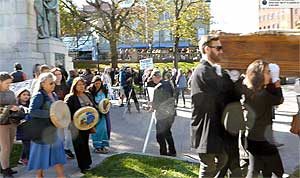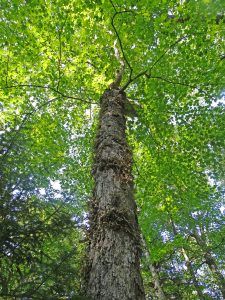“As I look around at folks who carry paper protest signs on sticks and ask you to bring tissues to an event that celebrates the death of a renewable resource — while eating their cardboard-packaged granola bars, holding their paper coffee cups and carrying a large wooden coffin — I start to wonder where the logic has all gone….By biting the hand that feeds them and by using emotional stimuli, the organizers of these types of protests continue to confuse the public and don’t communicate facts that help Nova Scotians understand forests, forestry and the renewable resource management, which are a major contributor to the financial stability of this province.”
She goes on to comment:
“We also need to resist the urge to make policy decisions based on emotion and understand that forest management is based on science and is a long-term business plan structure that considers sustainability of economics, water courses, habitats, biodiversity, soil conservation, recreation and cultural interests.”
Read the full commentary Education key in understanding lumber industry by Stacie Carroll, (Chronicle Herald Nov 16, 2017)
#2 Not so reassured, Shelly Hipson of Atlantic, Shelburne County writes
“My brother said he heard machinery near the old hunting camp located up the Ohio Road, past Indian Fields on Black Lake, Shelburne County. Machinery in the middle of the forest can only mean one thing: clearcutting….When I was a child, I’d escape to the forest at the back of the camp. The huge trees were magical and nothing like I’d ever seen before, reaching towards the sky. My little arms would embrace their trunks; I was never able to grasp around and lock my fingers. I’d lay my cheek on their bark listening to my heart beat.
“…Machinery has changed. As a child, I remember thinking that this place would be left untouched. At age 49, I lie here awake, thinking about those trees that gave me life and peace. They will crash towards the earth en masse. Not selectively. Not in a sustainable way. But in a way that saves companies money.
“My throat tightens. Tears fall down my cheeks. I grieve.”
View LETTER OF THE WEEK: Lament for my forest refuge by Shelly Hipson in the Chronicle Herald Nov 18, 2017.
Perhaps a longer term perspective helps. Leslie Corkum, “a nearly 95-year-old veteran who has spent a lifetime working in forestry, private industry and the Department of Lands and Forests” wrote in Chronicle Herald, Sep 29, 2017:
“At this particular time, I truly feel sorry for whoever our premier happens to be, his minister of natural resources, our natural resources advisory staff and the general public, including myself (who must dutifully pay our share of taxes), for being confused.
“During the past 50 or more years, there has been almost continuous “rabble-rouser” articles in the Voice of the People concerning our beloved forests. In order to understand how we arrived at this confusing juncture, I must guide you back in time to about 100 years ago.
“…I hate to say it, but possibly our forestry policy should be to highly regulate and only meet local demands. There — I’ve said it; I never thought I would. My father and my grandfather will roll over in their graves.
View OPINION: Take the bias out of forestry policy by Leslie Corkum (Chronicle Herald, Sep 29, 2017).
————
Coming in age somewhere between the 95-year-old who had a forestry background and the ‘youngsters’ who wrote into the Chronicle Herald from “both sides”, and coming from a more naturalist perspective, I have to agree with the 95-year old that “our forestry policy should be to highly regulate and only meet local demands.”
Things have changed since the days my great grandfather operated a mill on the Annapolis River, and he would also probably roll over in his grave.


